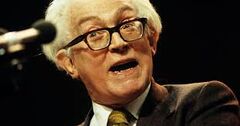Michael Foot
 | ||||||||||||||||||||||||||||||||||||||||||||||||||||||||||||||||||||||||||
| Born | Michael Mackintosh Foot 1913-07-23 Plymouth, Devon, England | |||||||||||||||||||||||||||||||||||||||||||||||||||||||||||||||||||||||||
| Died | 2010-03-03 (Age 96) Hampstead, London, England | |||||||||||||||||||||||||||||||||||||||||||||||||||||||||||||||||||||||||
| Alma mater | Wadham College, Oxford | |||||||||||||||||||||||||||||||||||||||||||||||||||||||||||||||||||||||||
| Spouse | Jill Craigie | |||||||||||||||||||||||||||||||||||||||||||||||||||||||||||||||||||||||||
| Member of | Harvard/International Seminar/1960 | |||||||||||||||||||||||||||||||||||||||||||||||||||||||||||||||||||||||||
| Party | Labour | |||||||||||||||||||||||||||||||||||||||||||||||||||||||||||||||||||||||||
| Relatives | • Isaac Foot • Sir Dingle Foot • The Lord Caradon • The Lord Foot • Paul Foot • Oliver Foot | |||||||||||||||||||||||||||||||||||||||||||||||||||||||||||||||||||||||||
| ||||||||||||||||||||||||||||||||||||||||||||||||||||||||||||||||||||||||||
Michael Foot (23 July 1913 – 3 March 2010) was a British Labour Party politician who served as Labour Leader from 1980 to 1983. Foot began his career as a journalist on Tribune and the Evening Standard.[1]
Codename 'Boot'
In July 1995, the Sunday Times was forced into a humiliating climb-down at the High Court over its allegations that Michael Foot was considered an "agent of influence" by the KGB.
The 81-year-old former Labour leader had sued the paper and its proprietor Rupert Murdoch over a three-page article last February, which - under the headline "KGB: Michael Foot was our agent" - detailed how the KGB had courted Labour politicians and trade union officials during the Sixties.
The story alleged Mr Foot had operated under the codename "Boot" and that the Soviet intelligence service made cash payments to the left-wing journal Tribune while he was editor.
Under a settlement read out in open court, the paper offered Mr Foot "substantial" damages - which with legal costs are believed to run to at least pounds 100,000 - and an assurance that it had never intended to suggest that he had been a spy.
Mr Foot, who was in court for the brief hearing, said afterwards: "I think the libel laws are very severe on newspapers ... But what the Sunday Times said was so serious - that I was a spy who had served one of the most wicked organisations that has existed this century - I thought it had to be wiped clear."
His solicitor David Price said that Times Newspapers' unsuccessful attempt to prevent Mr Murdoch from appearing in court had prompted the company's decision to reach a settlement. Mr Foot added: "If he [Mr Murdoch] owns newspapers which can make accusations of this nature, he should appear in court when they are raised."[2]